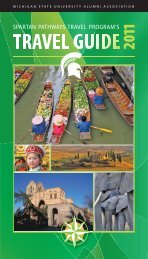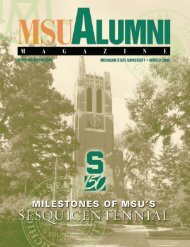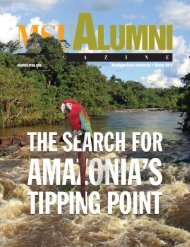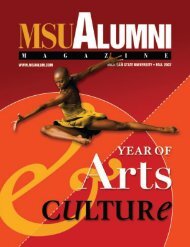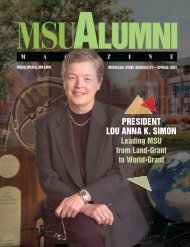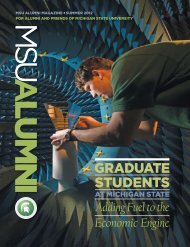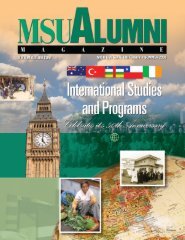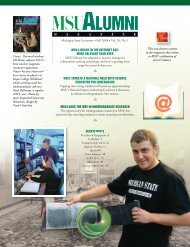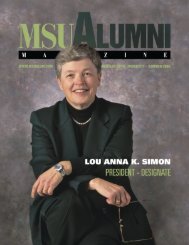mark dantonio - MSU Alumni Association - Michigan State University
mark dantonio - MSU Alumni Association - Michigan State University
mark dantonio - MSU Alumni Association - Michigan State University
You also want an ePaper? Increase the reach of your titles
YUMPU automatically turns print PDFs into web optimized ePapers that Google loves.
citement, the pleasure, the improvisational<br />
nature of learning as<br />
their new skills are internalized.<br />
A related concept, civic<br />
engagement, or active involvement<br />
in the community, also<br />
will play a critical role in the<br />
College. While <strong>MSU</strong> has a rich<br />
heritage of outreach and service<br />
in which students often have<br />
played a vital role, the Residential<br />
College seeks to engage<br />
students on every level and in<br />
every area.<br />
Students will have the opportunity<br />
to work in schools,<br />
refugee centers, community centers,<br />
and other venues. The goal<br />
is not service per se, although<br />
service will occur, but rather a<br />
reaching out, with mutual cooperation<br />
and learning between<br />
students and those with whom<br />
they work.<br />
“One of the goals of the Residential<br />
College is to integrate<br />
community service and civic<br />
engagement into the curriculum<br />
and the major as a whole,<br />
not just into one particular<br />
course as a module or an extra<br />
credit experience,” Esquith says.<br />
“This kind of active experiential<br />
learning can shape how<br />
students approach their other<br />
creative and intellectual work.”<br />
A hall<strong>mark</strong> of the RCAH will<br />
be its collaborative nature, as<br />
the College works with other<br />
“The arts and humanities not only<br />
give us the pleasure of living in<br />
the moment, but also the wisdom<br />
to make sound judgments and<br />
good choices.”<br />
<strong>MSU</strong> departments and colleges<br />
as well as with community<br />
partners. Students also will collaborate<br />
as they work with each<br />
other, with faculty and staff,<br />
and with members of the community<br />
in their civic engagement<br />
activities.<br />
Such collaboration will be<br />
important in preparing students<br />
for future careers and professions.<br />
“We work in groups; that’s<br />
how work is done in the world,”<br />
says Esquith. “We’re teaching<br />
the value of listening to other<br />
people’s views and being able to<br />
engage with other people as collaborators<br />
in a common project.”<br />
A <strong>State</strong> of the Art Facility<br />
About 125 students are expected<br />
to comprise the inaugural<br />
first-year class, with a goal of<br />
about 500 total students within<br />
four years. Students will be<br />
housed in the newly renovated<br />
Snyder-Philips complex. A new<br />
three-story facility connected<br />
to the two dormitories will<br />
house faculty and administrative<br />
offices, an art studio, music<br />
practice rooms, an art gallery<br />
for displaying visiting artist<br />
and student work, and even a<br />
small theatre for student performances<br />
and creative initiatives.<br />
Classrooms and seminar rooms,<br />
as well as the World Language<br />
Proficiency Center, will be<br />
equipped with the latest in educational<br />
technology.<br />
In addition, a wireless coffee<br />
house will provide ambiance—as<br />
well as a quick latte or<br />
cappuccino—and a new stateof-the<br />
art dining facility will<br />
feature an ever-changing menu,<br />
with choices ranging from<br />
world cuisine to cook-to-order<br />
stations to traditional Midwestern<br />
comfort food.<br />
Shaping the Future<br />
In a College that stresses student<br />
engagement, it comes as<br />
no surprise that students have<br />
been involved from the very<br />
beginning in discussions about<br />
the proposed College, serving<br />
in focus groups and on design<br />
and planning committees. And<br />
they will continue to help shape<br />
the College, helping to plan the<br />
following year’s curriculum,<br />
organize co-curricular activities,<br />
and develop the College’s<br />
governance structure. In so doing<br />
they will both utilize their<br />
developing skills and further<br />
hone them for use in the wider<br />
community and beyond.<br />
As stated in an RCAH planning<br />
committee report, “Students,<br />
faculty, and community<br />
partners in the arts and humanities<br />
have the power to focus<br />
critical attention on the public<br />
issues we face and the opportunities<br />
we have to resolve them.<br />
The arts and humanities not<br />
only give us the pleasure of living<br />
in the moment, but also the<br />
wisdom to make sound judgments<br />
and good choices. The<br />
mission, then, is to see things<br />
as they are, to hear things as<br />
others may, to tell these stories<br />
as they should be told, and to<br />
contribute to the making of a<br />
better world.”<br />
Carol A. Cole, ’75 (Social Work),<br />
’96 (English), is the office administrator<br />
in the Residential College in<br />
the Arts and Humanities.<br />
☛ For more information<br />
about the new college, please<br />
visit www.rcah.msu.edu.<br />
Click Right Through for <strong>MSU</strong><br />
www.msualum.com<br />
Page 29<br />
046957070001_26-29.indd 29<br />
2/2/07 1:47:04 PM




